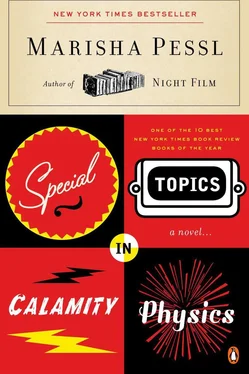“I’ll see you in Physics,” he said, turning on his heel and heading down the hall. Instantly, he was greeted by a girl who’d walked by only a minute ago — watching us out of the corner of her coin-slot eyes, then stopping by the water fountain and taking a drink of water. (She must have just trekked the Gobi Desert.) She was Rebecca of the camel teeth, a junior.
“Is your dad preaching this Sunday?” she asked him.
With a pang of irritation (as they continued their sacred conversation down the hall) I ripped open the giant envelope and inside, found glossy foe-toes of Zach and me stationed around his living room, our shoulders rigid, irregular smiles pressed deep into our faces.
In six of them, to my horror, my right bra strap was visible (so white it was almost neon purple and if one looked at the bra strap, then at something else, it drifted in one’s vision), but in the last foe-toe, the one Patsy had taken in front of the sun-lit window (Zach’s left arm rigid around my waist; he was a metal stand, I a collector’s doll) the light between us had gone buttery, splattering the lens, dissolving the outline of Zach’s left side and my right so we blended together and our smiles went the same color of the white sky poured between the naked trees behind us.
Frankly, I barely recognized myself. Usually in pictures I was either Stork Stiff or Ferret Frightened, but in this, I looked strangely bewitching ( literally: my skin was gold, there were paranormal pinpricks of green in my eyes). I looked relaxed too, like the kind of person one might find squealing in delight while kicking up sand on a piña-colada beach. I looked like I could be a woman who could forget herself entirely, let go of all the strings, let herself float away like a hundred helium balloons and everyone, everyone bound to the earth, stared at her enviously. (“A woman for whom reflection is as rare as a Giant Panda,” Dad said.)
Without thinking, I turned to look after Zach — maybe I wanted to thank him, maybe I wanted to say something more — but realized stupidly he was gone and I was left staring at the EXIT sign, the stampede of kids in stockings and shabby shoes rushing toward the stairs on their way to class.
A week or two later, on a Tuesday evening, I was sprawled across my bed, trudging through the battlefields of Henry V for AP English when I heard a car. Immediately, I went to the window and, peering through the curtains, watched a white sedan slink down the driveway like a punished animal, coming to a timid halt by the front door.
Dad wasn’t home. He’d left an hour before to go have dinner at Tijuana, a Mexican restaurant, with Professor Arnie Sanderson, who taught Intro to Drama and History of the World Theater. “A sad young man,” said Dad, “with funny little moles all over his face like enduring chicken pox.” Dad said he wouldn’t be home until eleven o’clock.
The headlights switched off. The engine died with a bloated belch. After a moment of stillness, the driver’s door opened and a pillarlike white leg fell out of the car, then another. (This entrance of hers, at first glance, seemed to be an attempt to act out some red-carpet fantasy, yet when the woman came into full view, I realized it was nothing but the sheer challenge of maneuvering in what she wore: a tight white jacket doing its best to bind her waist, a white skirt like plastic wrap around a bouquet of stocky flowers, white stockings, exceedingly high white heels. She was a giant cookie dipped in icing.)
The woman closed the door, and, somewhat hilariously, set about trying to lock the doors, having a hard time finding the keyhole in the dark, then the correct key. Adjusting her skirt (a movement akin to twisting a pillowcase around a pillow), she turned and tried not to make a sound as she boosted herself up onto our porch, her swollen hair — a citrus yellow color — shuddering over her head like a loose lamp shade. She didn’t ring the bell, but stood for a moment at the door, an index finger in her front teeth (the actor about to enter, suddenly uncertain of his first line). She shaded her eyes, bent to the left and looked in the window of our dining room.
I knew who she was, of course. There’d been a series of anonymous phone calls just prior to our departure for Paris (my “Hello?” was met with silence, then the hiccup of hanging up), and another less than a week ago. Swarms of June Bugs before her had shown up like this, out of the blue, in as many moods, conditions, and colors as a box of Crayola crayons (Brokenheart Burnt Umber, Seriously Pissed Cerulean, etc.).
They all had to see Dad again, wanted to pin him down, corner, cajole (in Zula Pierce’s case, maim) him, make a Final Appeal. They approached this doomed confrontation with the weightiness of appearing in federal court, tucking their hair behind their ears, sporting no-nonsense suits, pumps, perfume and conservative brass earrings. June Bug Jenna Parks even toted an unwieldy leather briefcase for her final showdown, which she primly rested on her knees, opened with the clichéd bite of all briefcase openings and, not wasting any time, returned to Dad a bar napkin on which he’d written, in happier days, “‘A woman’s face with Nature’s own hand painted / Hast thou, the master-mistress of my passion.’” They always made sure to add sexy punctuation to this expert appearance (crimson mouth, complex lingerie under a faintly transparent blouse) to tempt Dad, hint at what he was missing.
If he was home, he ushered them into the den in the manner of a cardiologist about to deliver bad news to a heart patient. Before closing the door, however, he’d ask me (Dad the all-knowing doctor, me the flighty nurse) to prepare a tray of Earl Gray tea.
“Cream and sugar,” he’d say with a wink — a suggestion that made an unlikely smile sprout on the June Bug’s bleak face.
After I put on the kettle, I’d return to the closed door in order to eavesdrop on her deposition. No, she couldn’t eat, couldn’t sleep, couldn’t touch or even look at another man (“Not even Pierce Brosnan and I used to think he was wonderful,” Connie Madison Parker confessed). Dad would speak — something muffled, inaudible — and then the door would open and the June Bug emerged from the courtroom. Her blouse was untucked, her hair full of static and, in the most disastrous part of this metamorphosis, her face, before, so meticulously made up, now, a Rorschach test.
She fled to her car, a little frown between her eyebrows like pleated fabric, and then she drove away in her Acura or Dodge Neon, as Dad, all resigned and weary sighs, settled comfortably into his reading chair with the Earl Gray tea I’d fixed for him (as he’d planned all along) to tackle another lecture on Third-World Mediation, another tome on Principles of Revolt.
It was always a tiny detail that made me feel guilty: the dirty grosgrain bow barely hanging on to the front of Lorraine Connelly’s left high heel, or Willa Johnson’s ruby triangle of polyester blazer; caught in the car door, it flapped in terror as she sped down the driveway not bothering to check for oncoming traffic before making the left onto Sandpiper Circle. Not that I hoped Dad would permanently keep one. It was an irksome thought, watching On the Waterfront with a woman who smelled like apricot potpourri from a restaurant bathroom (Dad and I rewinding our favorite scene, the glove scene, ten sometimes twelve times as the June Bug crossed and uncrossed her legs in huffy annoyance), or listening to Dad explain his latest lecture concepts (Transformationism, Starbuckization) to a woman who did forceful, newscaster “Uh-huh uh-huhs,” even when she didn’t understand a word. Still, I couldn’t help but feel ashamed when they cried (an empathy I wasn’t entirely sure they deserved; apart from a few flat questions about boys or my mother, none of them ever talked to me, eyeing me as if I were a few grams of plutonium, unsure if I was radioactive or benign).
Читать дальше












